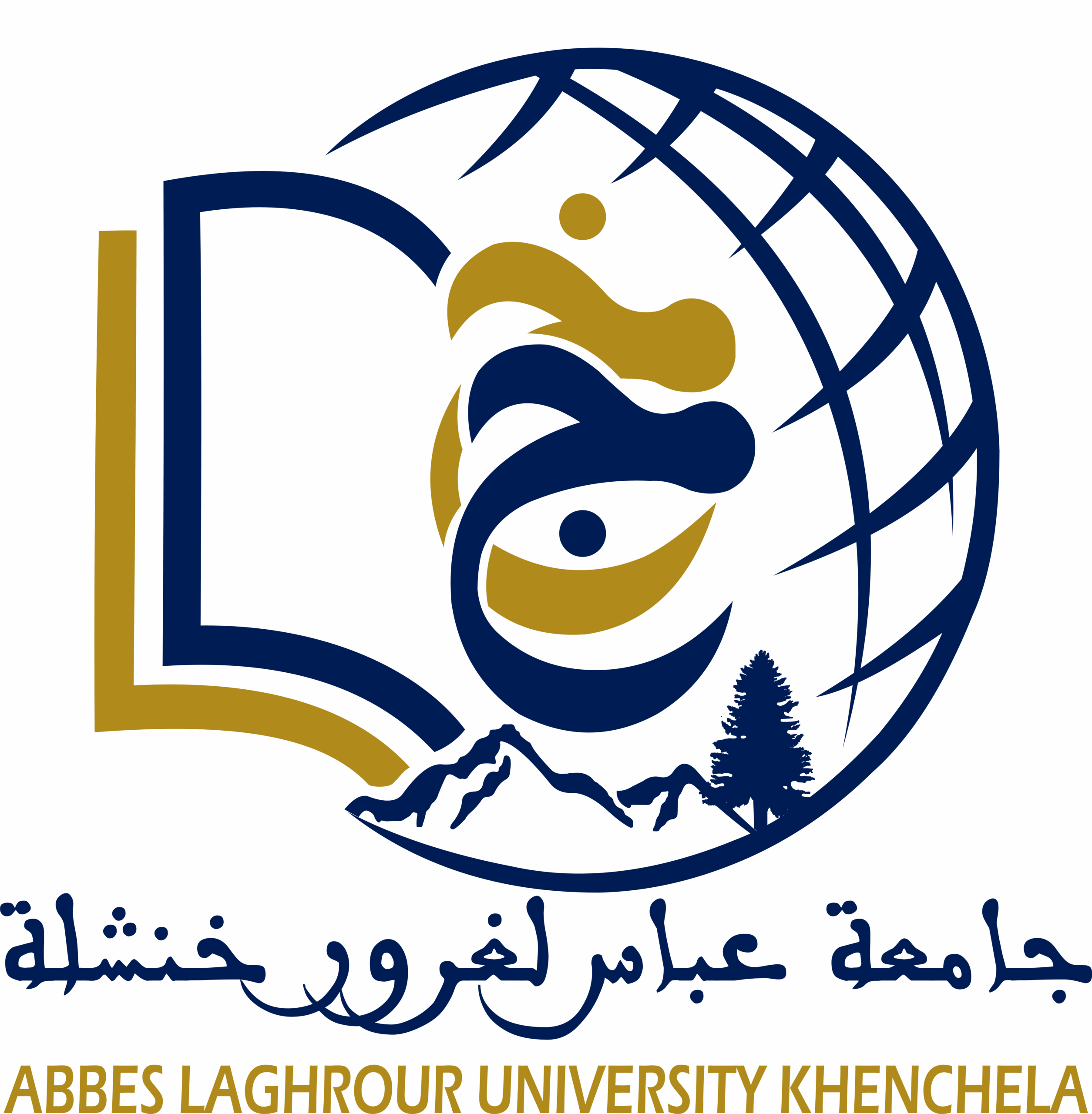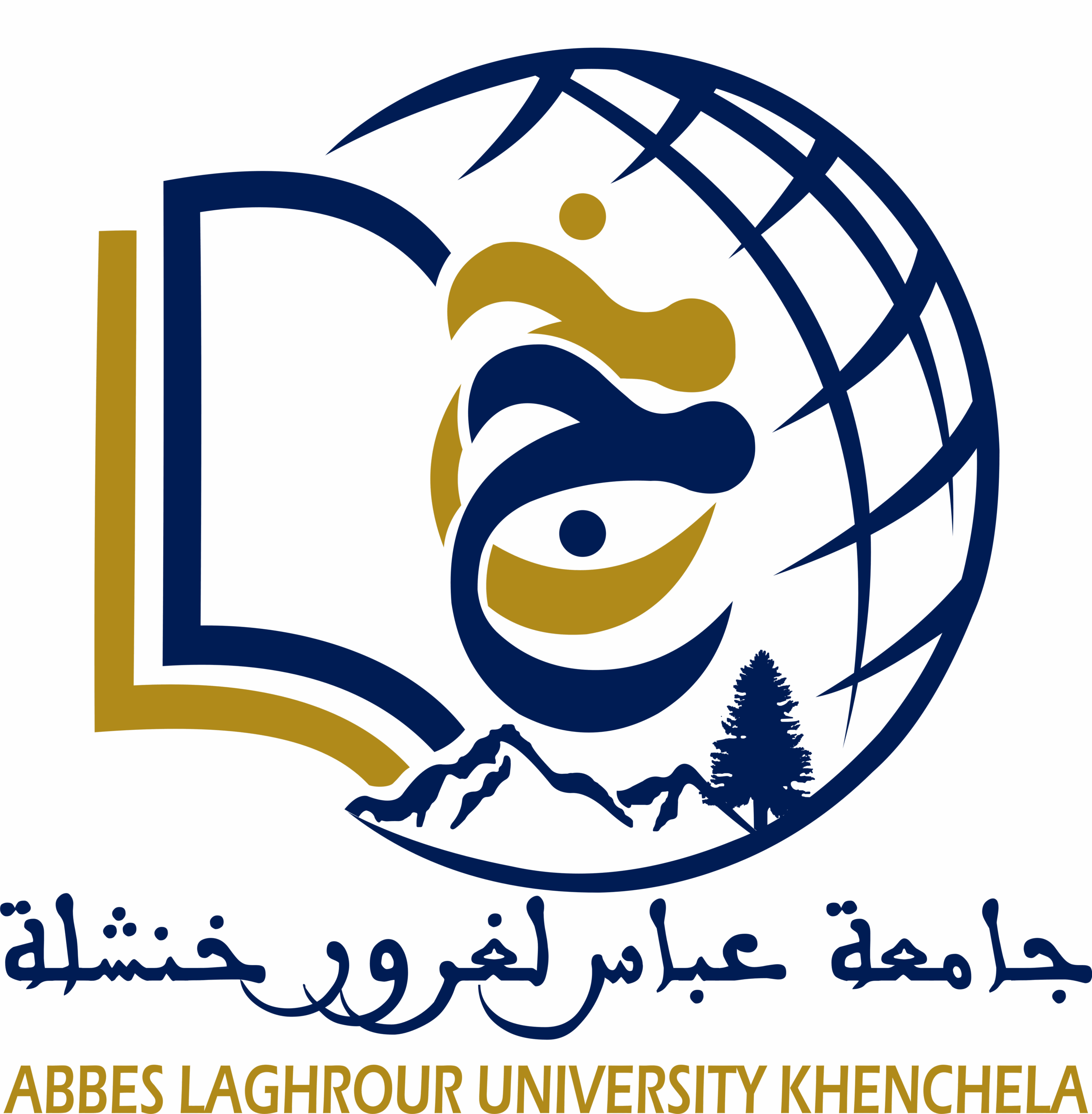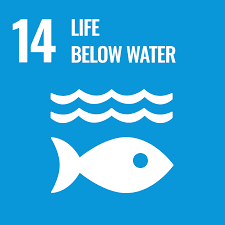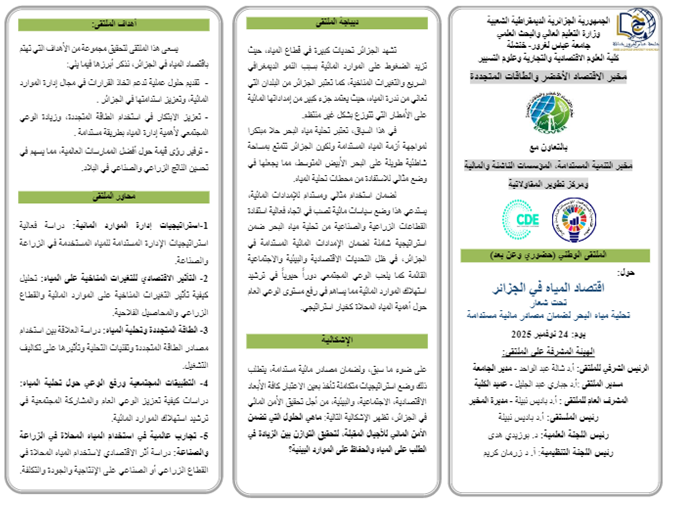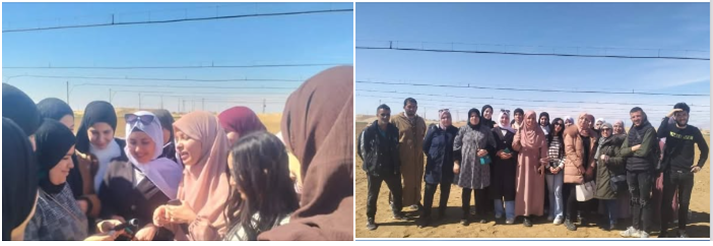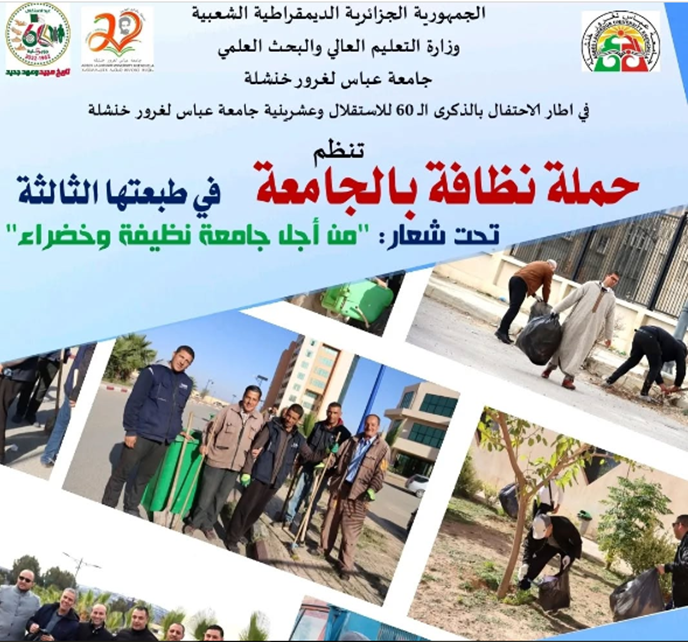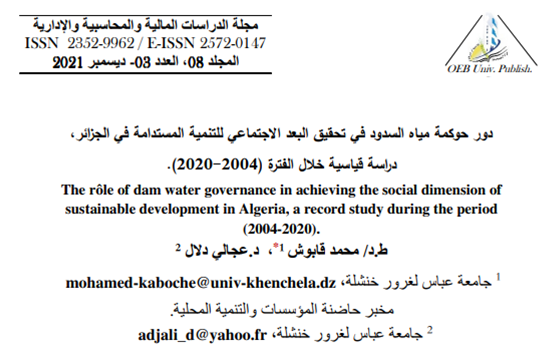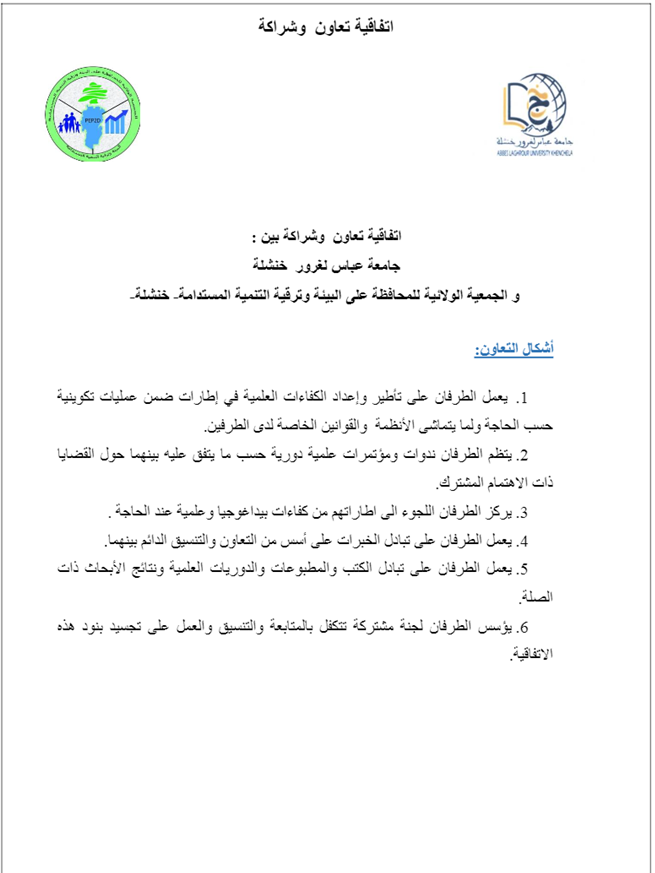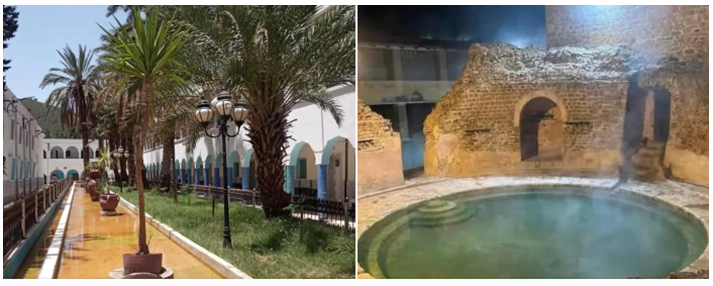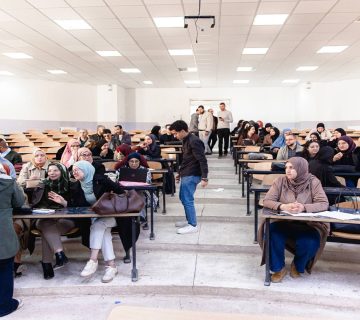14-02 Supporting Aquatic Ecosystems through Education
14-02-01
- Does your university as an institution offer educational programs on freshwater ecosystems (water irrigation practices, water management/conservation) to local or national communities?
- Yes, the University Khenchela offers diverse educational programs to the local and national community on freshwater ecosystems, through national conferences, practical field trips, and institutional partnerships.
Documented Achievements:
- National Conference: Water Economy in Algeria
- Topic: Seawater desalination to ensure sustainable water sources
- Importance: Reflects the university’s commitment to transferring knowledge to the community about modern technologies for securing water resources
- Community Impact: Raising awareness among researchers and practitioners about the importance of desalination as a strategic solution for Algeria
Scientific Field Trip for Environment and Surroundings Students
- Supervisors: Dr. Ouanes Mayada, Dr. Larbaa Rabah, Dr. Mazhoud Amal
- Location:Mechri farm for fish farming and wheat cultivation in Mita (south of the province)
- Educational Content :
- Introduction to the integrated aquaponics system: fish farming + agriculture
- Use of fish pond water for irrigation (rich in natural organic materials)
- Reducing dependence on chemical fertilizers and improving soil health
- Modern irrigation systems:
- Central pivot irrigation (Irrigation à pivot central)
- Flow Irrigation system
- Benefits: Rationalizing water consumption, raising crop productivity in arid areas
- Introduction to modern wheat cultivation techniques and seed production
Cooperation Agreement with the Irrigation Directorate of Khenchela Province
- Objective: Exchange of expertise and development of training programs for local farmers
- Fields: Water resources management, modern irrigation techniques, water conservation
Evaluation:
- Specializedacademic programs
- Practicalfieldactivities
- Effective institutional partnerships
14-02-02
- Does your university as an institution offer an educational/awareness program for local or national communities on sustainable management of fisheries, aquaculture and tourism?
- Yes, the University Khenchela offers educational and practical programs on sustainable management of aquaculture and fisheries, through field activities for its students and specialized academic courses.
Documented Achievements:
- Scientific Field Trip to Mechri Fish Farming Farm
- Practical model for sustainable aquaculture
- Educational Application: Training students on:
- Management of fishfarming ponds
- Utilizing fish waste in agriculture (circular economy)
- Integration of agricultural-aquaticsystems
- Environment and SurroundingsDepartment Programs
- Specialized courses in aquaculture
- Study of aquaticecosystems
- Fish resources management
Evaluation:
- The university has surpassed the stage of “partnership under development”
- Existence of actualfield applications
14-02-03
- Does your university as an institution offer educational awareness activities for local or national communities to raise awareness about overfishing, illegal, unreported and unregulated fishing, and destructive fishing practices?
- Yes, the University Khenchela contributes to raising awareness about the dangers of overfishing and destructive practices through its research and academic contributions that document challenges and provide strategic visions aligned with the national legal framework.
Documented Achievements from the University Khenchela:
- Academic Research: “Orientation towards the Blue Economy as a New Path for Sustainable Development”
- Researchers: Dr. Chamia Ben Abbas, Mr. AkramLaour (University of Khenchela)
- Publication Date: 2019
- Content Related to SDG 14-02-03:
Research Contributions to Awareness:
- Documentation of fish resources crisis:
- The research indicated that marine stocks are stagnant and far from the outlined ambitions
- The necessity of serious thinking in finding solutions and adopting procedures and strategies that ensure their sustainability and efficient exploitation
- Focus on sustainability:
- Blue economy objectives include eliminating harmful fishing practices, and instead stimulating approaches that would promote growth while reducing the phenomenon of climate change and marine environment degradation
- Combatingillegalfishing:
- Improving, preserving and building sustainable fisheries, and ending illegal fishing
- Combating illegal fishing through supporting rational fishing and restoring fish stocks
Importance of Academic Research:
- Contributing to spreading scientific awareness about the importance of preserving marine resources
- Documenting challenges facing sustainable fishing in Algeria
- Providing a strategic vision for combating destructive practices
- Marine Fishing and Aquaculture Law (Law 01-11)
- The draft law amending and supplementing Law No. 01-11 dated July 3, 2001 related to marine fishing and aquaculture came to define the pillars of exploiting fishing resources
- Amendments relate to:
- Penalties and serious definitions related to responsible marine fishing
- Defining illegal fishing practices, and penalties more precisely and strictly to enhance methods and means of combating and monitoring violations
14-03 Supporting Aquatic Ecosystems through Action
14-03-01
- Does your university as an institution have a policy to ensure the conservation, restoration and sustainable use of terrestrial ecosystems associated with the university, especially forests, mountains and drylands?
- Yes, the University of Khenchela effectively contributes to preserving terrestrial ecosystems associated with water through its support and participation in strategic national initiatives such as the “Green Algeria Initiative” aimed at combating soil degradation and preserving ecological balance.
The university effectively contributes in this field through supporting national initiatives such as the “Green Algeria Initiative” to plant one million trees. The importance of this participation lies in:
- Combating soil degradation: Afforestation contributes to preserving soil and preventing its erosion towards dams and valleys, which improves water quality and preserves aquatic ecosystems.
- Preserving ecological balance: Planting local species such as olive and pistachio contributes to the sustainability of terrestrial ecosystems which are considered the natural reservoir for water resources.
- Strategic partnerships: The university, through its research staff and students, can be a strategic partner for the General Directorate of Forests and environmental associations in implementing and monitoring these initiatives.
14-03-02
- Does your university as an institution support and/or organize events aimed at promoting the conservation and sustainable use of oceans, seas, lakes, rivers and marine resources?
- Yes, the University Khenchela supports and organizes advanced research events and activities aimed at promoting the conservation and sustainable use of water resources, through its specialized research teams and strong institutional partnerships with irrigation and water sectors.
Exceptional Research Achievements:
Research Team 4: Applied Geomatics for Integrated Management of Natural and Agricultural Hydrological Resources
Responsible:
- Dr. Aouidane Laiche, Lecturer “A”
- Specialization: Agricultural Sciences
- Email: aouidane.laiche@univ-khenchela.dz
Team Members:
- Dr. Aouidane Laiche (Habilitation)
- Dr. Ben Heziya Taoufik (Habilitation)
- Goubi Mustapha (Master’s – Forests and Soil Protection)
Strategic Research Axes:
- Integrated Water Resources Management:
- Spatial geographic modeling of drainage basins
- Analysis and mapping of soil and groundwater salinization
- Development of GIS-based Decision Support Systems (DSS) for water resource allocation
- Agricultural-HydrologicalPlanning:
- Application of Geostatistics techniques to estimate irrigation needs
- Simulation of climate change impacts on water resources and crops
- Study of soil management impact on water resource availability
- Artificial Intelligence and GIS:
- Design of predictive models using neural networks to assess groundwater quality
- Automation of agricultural crop classification using Machine Learning
- Development of geographic web platforms for collaborative management of natural resources
- Protection of Sensitive Areas:
- Identification and protection of Wetlands using geospatial data
- Study of land use conflicts related to urban and agricultural growth
- Preparation of scenarios for sustainable management
- RemoteSensing:
- Monitoring drought and flood evolution using satellite data
- Detection of changes in land use
- Temporal and spatial analysis of water cycles
- EnvironmentalTreatment:
- Development of Phytoremediation techniques
- Treatment of polluted water and soil
- Reuse of non-conventional water in irrigation with environmental risk assessment
Strategic Partnerships:
- Agreement with the Ministry of Public Works and Irrigation
- Partner: Algérienne Des Eaux – Batna
- Fields:
- Development of DSS systems for water resources
- Joint appliedresearch
- Exchange of data and expertise
- Agreement with the Irrigation Directorate of Khenchela Province
- Field application of research
- Solving local water problems
Integrated Disciplines:
- Civil Engineering Department: Environmental engineering, water treatment, waste management
- Agricultural Sciences Department: Irrigation, soil management, crops
- Environment and Surroundings Department: Ecosystems, pollution, biodiversity
Evaluation:
- Advanced research using artificial intelligence and GIS
- Strong institutional partnerships
- Direct practical applications
- Knowledgedisseminationthroughconferences
14-03-03
- Does your university as an institution have a policy to ensure that food harvested on campus that comes from aquatic ecosystems is done sustainably?
- Yes, the University of Khenchela adopts practical models for sustainable harvesting from aquatic ecosystems through its partnership with pioneering farms that apply integrated systems for fish farming and agriculture, and uses these models in educating and training its students.
Documented Achievements:
- Mechri Farm as a Practical Model:
- Integrated system combining:
- Fish farming (protein source)
- Wheat cultivation (seed production)
- Aquaponics system (using fish water for irrigation)
- Scientific Research in Aquaculture:
- Within the axes of Research Team 4
- Study of integratedsystems
- Assessment of environmental and economic sustainability
Evaluation:
There is a practical model outside the campus
- The university has a partnership with a farm applying this system
- Recommendation: Establishing an experimental project inside the campus
- Benefiting from the expertise of Research Team 4 to design the system
14-03-04
- Does your university as an institution work directly (research and/or participation with industries) on technologies or practices that enable the marine industry to reduce or prevent damage to aquatic ecosystems?
- Yes, the University of Khenchela works indirectly on developing technologies and practices that contribute to reducing the environmental impact of water industries, through its advanced research in the fields of water treatment, technological innovation, and recycling of industrial waste.
The university contributes in this field through advanced research on waste recycling, as evident in the research by Dr. Chamia Ben Abbas and Lilia Ben Mansour on “Investment in Waste Recycling.”
- Preventing pollution at the source: Research on recycling industrial waste contributes to developing technological solutions to prevent hazardous pollutants from reaching water resources.
- Converting waste to resources: Through calling for the establishment of micro-enterprises for waste recycling, the university contributes to transforming an environmental burden into an economic opportunity, which is the essence of the circular economy.
- Awareness and sensitization: The research included recommendations on the necessity of launching awareness campaigns for citizens and investors about the importance of sorting and recycling, which reduces random dumping that pollutes groundwater and surface water.
These research efforts coincide with the national orientation towards the circular economy, which was strengthened by issuing the new Law No. 25-02 related to waste management, and the convening of the International Exhibition for Recovery and Valorization of Waste “REVAD 2025” provides a platform for university researchers to showcase their innovations.
Related Research Achievements:
- Water Treatment Research (Civil Engineering Department)
- Environmental engineering
- Advanced water treatment techniques
- Pollution control
- Technological Innovation (Research Team 4)
- Smart sensors for monitoring water quality
- Development of digital platforms for water resources management
- Predictivemodels for water quality
- EnvironmentalTreatment:
- Phytoremediation of polluted water
- Non-conventional water reuse techniques
- Environmental impact assessment
Evaluation:
- The university develops technologies that can be applied in water industries
- Recommendation: Expanding partnerships to include Algerian marine industries
- Focus on technology applications in protecting aquatic systems
14-04 Disposal of Water-Sensitive Waste
14-04-01
- Does your university as an institution have water quality standards and guidelines for water discharge (to maintain water quality for the protection of ecosystems, wildlife, human health and well-being, etc.)?
- Yes, the University Khenchela possesses scientific expertise and advanced research capabilities to establish and apply water quality standards, as its research teams use artificial intelligence and modeling techniques to assess and govern water quality, which lays the foundation for water and wastewater management policies.
Documented Achievements from the University Khenchela:
- Academic Research: “The Role of Dam Water Governance in Achieving the Social Dimension of Sustainable Development”
- Researchers: PhD student/ Mohamed Gabouch, Dr. AjaliDalal (University of Khenchela)
- Publication Date: 2021
- Content Related to SDG 14-04-01:
Contributions to Water Management:
- Integrated Water Resources Governance:
- Integrated water resources governance is a systematic working method to achieve sustainable development, aiming to monitor and allocate water resources in light of economic, social and environmental objectives
- Water GovernanceConcept:
- A process with a human dimension and objective whose actual purpose is achieving social justice without neglecting the role of vital sectors in their various spectrums in the context of water governance
- Several motivational processes for individuals to participate in planning and design, and implementing a water use and management plan in parallel with adapting to climate changes
- Standard Study (2004-2020):
- Methodology: Using the statistical program Eviews 11 at a significance level of 5%
- Main Results:
- Dam capacity in Algeria is continuously increasing but at a slow pace
- The significant and direct impact of increasing dam capacity on achieving the social dimension of sustainable development through increasing per capita water share
- The relationship between them is a direct relationship, as dam capacity increases, per capita water share increases
- Water Infrastructure:
- Algeria is considered a country rich in its various water energy sources, as its vast area makes it abound with large amounts of precipitation estimated between 100 and 120 billion m³ annually
- Flows that pour into valleys were estimated at 12.5 billion m³, of which 8 billion m³ is stored in dams and the rest flows into the sea
- Strategic Recommendations:
- The necessity of water governance in Algeria
- Completion of more dams to preserve unutilized falling water quantities
- The necessity of moving towards a seawater desalination strategy by increasing the number of desalination plants to cover the increasing demand for water and achieve sustainable development
14-04-02
- Does your university as an institution have a policy to reduce plastic waste on campus?
- Yes, the University of Khenchela contributes to reducing waste in general, including plastic, through encouraging scientific research aimed at “Investment in Waste Recycling,” and providing recommendations to establish recycling enterprises and spread environmental culture to reduce random dumping.
In Khenchela province, there are containers designated for sorting plastic waste and others, which have been distributed to municipalities with the aim of collecting and sorting plastic waste. The university works in cooperation with local authorities and other sectors to make the sorting and recycling process successful. The designated containers differ according to the city, and Khenchela has 2000 containers of a new type for selective sorting.
- Containers and sorting:Khenchela province was provided with 2000 new containers for selective sorting of household waste to collect plastic waste and other recyclable materials.
- Efforts made: Provincial services supervise, in cooperation with other sectors, waste collection and sorting operations for recycling.
- University coverage: Abbes Laghrour University is part of the waste management process in the province, as it is involved in waste collection and sorting plans with the aim of improving the living environment.
- Cooperation: These operations include cooperation with various actors such as university residences, directorates and municipalities, in addition to involving civil society organizations.
- Objective: This project aims to achieve success in the selective sorting process and achieve sustainable development in the province.
14-04-03
- Does your university as an institution have a policy to prevent and reduce marine pollution of all kinds, especially from land-based activities?
- Yes, the University of Khenchela possesses research capabilities and advanced scientific expertise that contribute to preventing and reducing water pollution of all kinds, through its teams specialized in environmental engineering, water treatment, and developing innovative techniques for waste management.
Despite the absence of a documented official policy specific to the campus, the University of Khenchela possesses research capabilities and advanced scientific expertise that place it at the forefront of institutions capable of developing and applying these standards, through:
- Research expertise in water governance: The research by Dr. Mohamed Gabouch and Dr. AjaliDalal on “Dam Water Governance” shows the university’s possession of expertise in standard analysis and water resources management at the national level, which enables it to develop internal policies based on scientific foundations.
- Advanced technology in water monitoring: Research Team 4 (Applied Geomatics) led by Dr. AouidaneLaiche possesses unique expertise in using artificial intelligence and geographic information systems to design predictive models for groundwater quality, which are techniques that can be directly applied to monitor wastewater at the university.
- Engineering capabilities: The Civil Engineering Department provides the necessary competencies in the field of water treatment and waste management, allowing the design and implementation of practical solutions such as establishing an internal treatment plant.
14-05 Preserving the Local Ecosystem
14-05-01
- Does your university as an institution have a plan to reduce physical and/or chemical and/or biological changes to relevant aquatic ecosystems?
- Yes, the University Khenchela possesses strategic research plans aimed at understanding and reducing changes in aquatic ecosystems, through the use of spatial geographic modeling, simulation of climate change impacts, and identification and protection of sensitive areas such as wetlands.
14-05-02
- Does your university as an institution monitor the health of aquatic ecosystems?
- Yes, the University Khenchela contributes to monitoring the health of aquatic ecosystems through applying modern and innovative techniques, as its research teams use remote sensing, artificial intelligence, and predictive modeling to assess water quality and monitor drought and flood evolution.
14-05-03
- Does your university as an institution develop and support programs and incentives that encourage and maintain good water management practices?
- Yes, the University Khenchela develops and supports educational programs that encourage good water management practices from a legal and legislative perspective, through teaching specialized courses such as “Maritime Law” which establishes a generation of graduates aware of the importance of protecting aquatic systems.
The university offers a specialized legal educational program covering the legislative and regulatory aspects of life below water, which contributes to forming a generation of jurists aware of the importance of protecting aquatic ecosystems.
The university publication “Lectures on Maritime Law” prepared by Dr. Adel Issaoui, which was approved by the Scientific Council of the Faculty of Law and Political Sciences on December 7, 2023, represents conclusive evidence of the existence of specialized and directed educational programs in this field.
- Documented Achievement: Authorization of the university publication “Maritime Law” for teaching and printing.
- Content and Importance:
- Specialized program: The publication is directed to third-year undergraduate law students (private law), which confirms the existence of a specialized course studying the legal framework for aquatic life.
- Organization of marine activity: The lectures aim to organize marine life and codify maritime navigation, which directly feeds into the objectives of raising awareness about sustainable management of fisheries and tourism.
- Algerian and international legislation: The publication addresses Algerian maritime legislation and its connection to the international dimension, providing students with a comprehensive understanding of laws governing illegal fishing, pollution, and protection of marine resources.
- Historical and modern awareness: The publication reviews the historical development of maritime law in Algeria since its legislation in 1976 and its amendments in 1998 and 2010, reflecting the university’s interest in teaching modern regulatory frameworks.
14-05-04
- Does your university as an institution collaborate with the local community, for example through partnerships, in efforts to preserve shared aquatic ecosystems?
- Yes, the University Khenchela collaborates closely and in a documented manner with the local community to preserve shared aquatic ecosystems, through a strategic partnership agreement with the “Provincial Association for Environmental Conservation and Promotion of Sustainable Development”.
Abbes Laghrour University Khenchela as an institution collaborates with the local community in efforts to preserve ecosystems.
According to the attached document, the university concluded a “cooperation and partnership agreement” with an active party in the local community, which is the “Provincial Association for Environmental Conservation and Promotion of Sustainable Development – Khenchela”.
This partnership aims to strengthen joint efforts in the field of environmental protection, and the forms of cooperation mentioned in the agreement include the following:
- Framing and preparing scientific competencies: The university works in cooperation with the association to qualify scientific cadres through training processes.
- Exchange of expertise and coordination: The two parties work on exchanging expertise and permanent coordination between them.
- Scientific and pedagogical support: The university provides its scientific and pedagogical expertise and competencies to support the association’s activities when needed.
- Joint scientific activities: Seminars and scientific conferences are organized periodically on issues of common interest.
- Exchange of research publications: The two parties exchange books, publications, scientific periodicals, and related research results.
- Follow-up and implementation: The two parties establish a joint committee to follow up and coordinate work on implementing the provisions of this agreement.
14-05-05
- Has your university as an institution implemented a strategy for managing water catchments based on the diversity of aquatic species in the specific location?
- Yes, the University of Khenchela has contributed to implementing water catchment management strategies through providing specialized scientific studies to local authorities with the aim of optimal and sustainable exploitation of important water gatherings, such as the “Hammam Essalihine” area.
Abbes Laghrour University Khenchela has contributed to the efforts made for optimal exploitation of the water gathering in the “Hammam Essalihine” area through providing specialized studies to the province.
This scientific contribution falls within the university’s role as a strategic partner in local development, where it:
- Provides scientific expertise: Harnessing its researchers and experts in the fields of hydrology (water science), geology, environment, and tourism to assess water resources in Hammam Essalihine.
- Supports decision-making: Providing local authorities (the province) with scientific studies and reports based on accurate data, helping them develop well-considered plans and strategies for optimal and sustainable water exploitation.
- Develops sustainable management: These studies likely include recommendations on how to manage water catchments, preserve the chemical and therapeutic properties of water, protect biodiversity in the surrounding area, in addition to developing the tourism aspect in a way that does not harm natural resources.
Through providing these studies, the university confirms its role as a fundamental actor in the local community, where its role is not limited to education only, but extends to include applied scientific research that serves the sustainable development goals of the province.
14-02-1 14-02-2 14-02-3 14-03-1 14-03-2 14-03-3 14-04-2 14-04-3